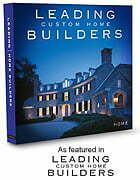Consulting with a builder before drawing the plans will save expense and headaches.
Most custom builders have had clients show up at their office with a set of finished plans that, in reality, will cost 25% to 30% more than the clients’ target budget. Fortunately, this problem is easily avoided. Working with the builder on a pre-budget can eliminate unpleasant surprises and help the clients get the home they want at a price they can manage.
Pre-budgeting is essential because a lot of people base their cost expectations on average square foot prices that they got from acquaintances, the Internet, or the advertised prices of homes in new developments. But this approach is misleading when planning a custom home.
That’s because those new development homes tend to be speculative, or “spec” houses. Spec houses are built from value-engineered stock plans that eliminate features that don’t increase the home’s appraised value. For example, additional square footage adds value but a high-end built-in refrigerator does not.
Even a top-quality spec house is built using a production business model. Think of a spec house development under construction as an outdoor factory: each house uses the same menu of materials and finishes, so the builder can get volume pricing from distributors and manufacturers. Also, because all floor plans are similar (if not exactly the same), crews can assemble them quickly and efficiently. Repetition works to keep prices down.
Custom homebuilders work in a far different world. Each home they build has a unique floor plan as well as many products and materials that are, well, custom. The homeowners get exactly what they want, but sometimes pay a premium compared to a spec home of similar size.
With a custom home, it’s best for customers to ask a professional builder to review their initial vision before they get the plans drawn. The builder can suggest ways to value-engineer the home and to save money on products and materials. Years of experience have taught the pro the most efficient approaches to new home construction, which means the builder can work with the architect to make sure the plan minimizes waste and can be built cost-effectively.
And while custom builders may not buy products in bulk, they are highly skilled purchasers who know how to get the best-available pricing. They can suggest brands and models that look and perform as well as the ones the customers have in mind, but that are kinder to the budget.
Once the design process gets underway, it’s a good idea to have the builder do spot checks at different stages. A design-build company will do this as a matter of course, and many architects will involve a contractor in the design. Be sure to ask. If the architect doesn’t offer this type of builder review, then insist on having it done. If the contractor hasn’t been chosen yet, paying one a consulting fee could be a wise investment.
If the client needs bank financing, a pre-budget is a vital reality check. Banks generally won’t lend more than 80% of the home’s appraised value, which is based on the price of “comparable” homes. But their comparisons don’t include every feature. Expensive kitchen appliances and nice landscaping packages add cost, but in the bank’s eyes they won’t increase the home’s value. That forces the homeowners to come up with unexpected cash. A professional builder will know what features do and don’t add value in the bank or appraiser’s estimation.
The bottom line is that involving a professional builder at the earliest stages of the design is an investment that may more than pay for itself.









